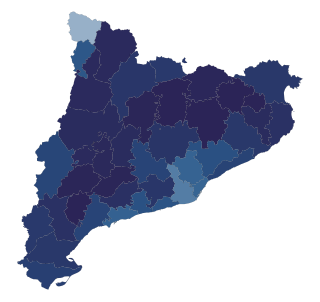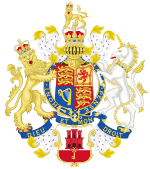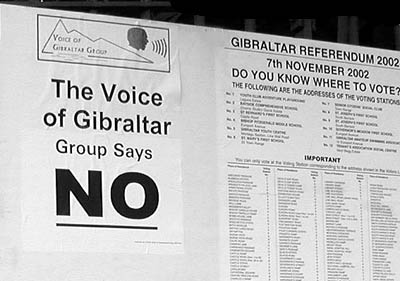The history of Gibraltar portrays how The Rock gained an importance and a reputation far exceeding its size, influencing and shaping the people who came to reside here over the centuries.

The politics of Gibraltar takes place within a framework of a parliamentary representative democratic British Overseas Territory, whereby the Monarch of the United Kingdom is the constitutional head of state represented by the Governor of Gibraltar. The Chief Minister of Gibraltar is the head of Government. As a British Overseas Territory, the Government of Gibraltar is not subordinate to the Government of the United Kingdom. The British Government, however, is responsible for defence and external affairs but Gibraltar has full internal self-government under its 2006 Constitution. Gibraltar is represented in the European Union, having been the only British Overseas Territory to have joined the European Economic Community under the British Treaty of Accession (1973).

Reference Re Secession of Quebec, [1998] 2 SCR 217 is a landmark judgment of the Supreme Court of Canada regarding the legality, under both Canadian and international law, of a unilateral secession of Quebec from Canada.

Sir Joseph John Bossano KCMG is a Gibraltarian politician who served as Chief Minister of Gibraltar from 1988 to 1996 and Leader of the Gibraltar Socialist Labour Party from 1978 to 2011. He served as Leader of the Opposition from 1984 to 1988 and 1996 to 2011.

A referendum was expected to take place in the United Kingdom in 2006 to decide whether the country should ratify the proposed Treaty establishing a Constitution for Europe. However, following the rejection of the Constitution by similar referendums in France in May 2005 and the Netherlands in June 2005, the UK vote was postponed indefinitely. The question was rendered moot when the constitution was superseded by the Treaty of Lisbon, which Parliament ratified in 2008 without holding a referendum.

Gibraltar, a British Overseas Territory, located at the southern tip of the Iberian Peninsula, is the subject of an irredentist territorial claim by Spain. It was captured in 1704 during the War of the Spanish Succession (1701–1714). The Spanish Crown formally ceded the territory in perpetuity to the British Crown in 1713, under Article X of the Treaty of Utrecht. Spain later attempted to recapture the territory during the thirteenth siege (1727) and the Great Siege (1779–1783). British sovereignty over Gibraltar was confirmed in later treaties signed in Seville (1729) and the Treaty of Paris (1783).

The Gibraltar Constitution Order 2006 was taken to a referendum in Gibraltar on 30 November 2006. A coalition of groups opposing the proposal held that a majority of 60% should be required to give effect to a new Constitution, quoting other instances, but the political parties held that the result should be decided by a simple majority in favour of the new constitution. The constitution was approved by 60% of the votes anyway.

Gibraltar National Day, celebrated annually on 10 September, is the official national day of the British overseas territory of Gibraltar. The day commemorates Gibraltar's first sovereignty referendum of 1967, in which Gibraltarian voters were asked whether they wished to either pass under Spanish sovereignty, or remain under British sovereignty, with institutions of self-government.

The Gibraltar Constitution Order 1969 was published on 30 May 1969 as an Order in Council.

The Gibraltar sovereignty referendum of 1967 was held on 10 September 1967, in which Gibraltarian citizens were asked whether they wished to pass under Spanish sovereignty, with Gibraltarians keeping their British citizenship and a special status for Gibraltar within Spain; or remain under British sovereignty, with institutions of self-government.

The preamble to the Constitution of India is a brief introductory statement that sets out guidelines, which guides the people of the nation, and to present the principles of the Constitution, and to indicate the source from which the document derives its authority, and meaning The hopes and aspirations of the people are described in it. The preamble can be referred to as the preface which highlights the entire Constitution. It was adopted on 26 November 1949 by the Constituent Assembly and came into effect on 26 January 1950, celebrated as the Republic day in India.

The following outline is provided as an overview of and topical guide to Gibraltar:

The United Kingdom does not have a codified constitution such as other countries tend to have. Instead of such a constitution, certain documents stand to serve as replacements in lieu of one. These texts and their provisions therein are considered to be constitutional, such that the "constitution of the United Kingdom" or "British constitution" may refer to a number of historical and momentous laws and principles like the Acts of Union 1707 and the Acts of Union 1800 which formulate the country's body politic. Thus the term "UK constitution" is sometimes said to refer to an "unwritten" or uncodified constitution. The British constitution primarily draws from four sources: statute law, common law, parliamentary conventions, and works of authority. Similar to a constitutional document, it also concerns both the relationship between the individual and the state and the functioning of the legislature, the executive, and the judiciary.
The Statute of Autonomy of Catalonia of 2006 provides Catalonia's basic institutional regulations under the Spanish Constitution of 1978. It defines the rights and obligations of the citizens of Catalonia, the political institutions of the Catalan community, their competences and relations with the rest of Spain, and the financing of the Government of Catalonia.

Gibraltar is a British Overseas Territory located on the southern end of the Iberian Peninsula at the entrance of the Mediterranean Sea. During the early days of the British administration, Gibraltar was maintained primarily as a military outpost with limited attention paid to its role as a trading post. Initially long term settlement of Gibraltar was uncertain but as Spain's power waned it became established as an important base for the British Royal Navy. Throughout the 19th century there was conflict between the competing roles of military and trading posts, leading to tensions between the civilian population and the Governor of the day. Some Governors encouraged the development of the civilian role in government, whilst others regarded it as a nuisance. As a result, compared with other former British colonies, civilian Government in Gibraltar emerged largely in the 20th century as the needs of the civilian population were often considered by Governors as subordinate to the needs of the military. Since World War II, Gibraltarians have increasingly asserted their own individual identity. The Rock's relationship with Spain and the sovereignty dispute continues to affect the Politics of Gibraltar to this day.
The Lisbon Agreement was the first of a series of agreements between the British and Spanish governments intended to resolve their differences over Gibraltar.
The Brussels Agreement, 1984 was an agreement between the Governments of the United Kingdom and Spain concerning the territorial dispute over Gibraltar. The agreement was criticised by Gibraltar politicians for limiting the participation of Gibraltarians in determining their own future.

A non-binding Catalan self-determination referendum, also known as the Citizen Participation Process on the Political Future of Catalonia, was held on Sunday, 9 November 2014, to gauge support on the political future of Catalonia. While also referred to as "Catalan independence referendum", the vote was rebranded as a "participation process" by the Government of Catalonia, after a "non-referendum popular consultation" on the same topic and for the same date had been suspended by the Constitutional Court of Spain.

The effect of Brexit on Gibraltar concerns the status of Gibraltar after withdrawal of the United Kingdom from the European Union. The UK voted to leave the EU in the 2016 referendum and formally notified the EU of its intention to withdraw in March 2017. Gibraltar is not part of the UK but, as a British Overseas Territory, participated in the referendum and will, by default, cease to be a part of the EU upon the UK's withdrawal.

The Catalan declaration of independence was a resolution that was passed by the Parliament of Catalonia on 27 October 2017, which declared the independence of Catalonia from Spain and the founding of an independent Catalan Republic. The declaration did not receive recognition from the international community.















